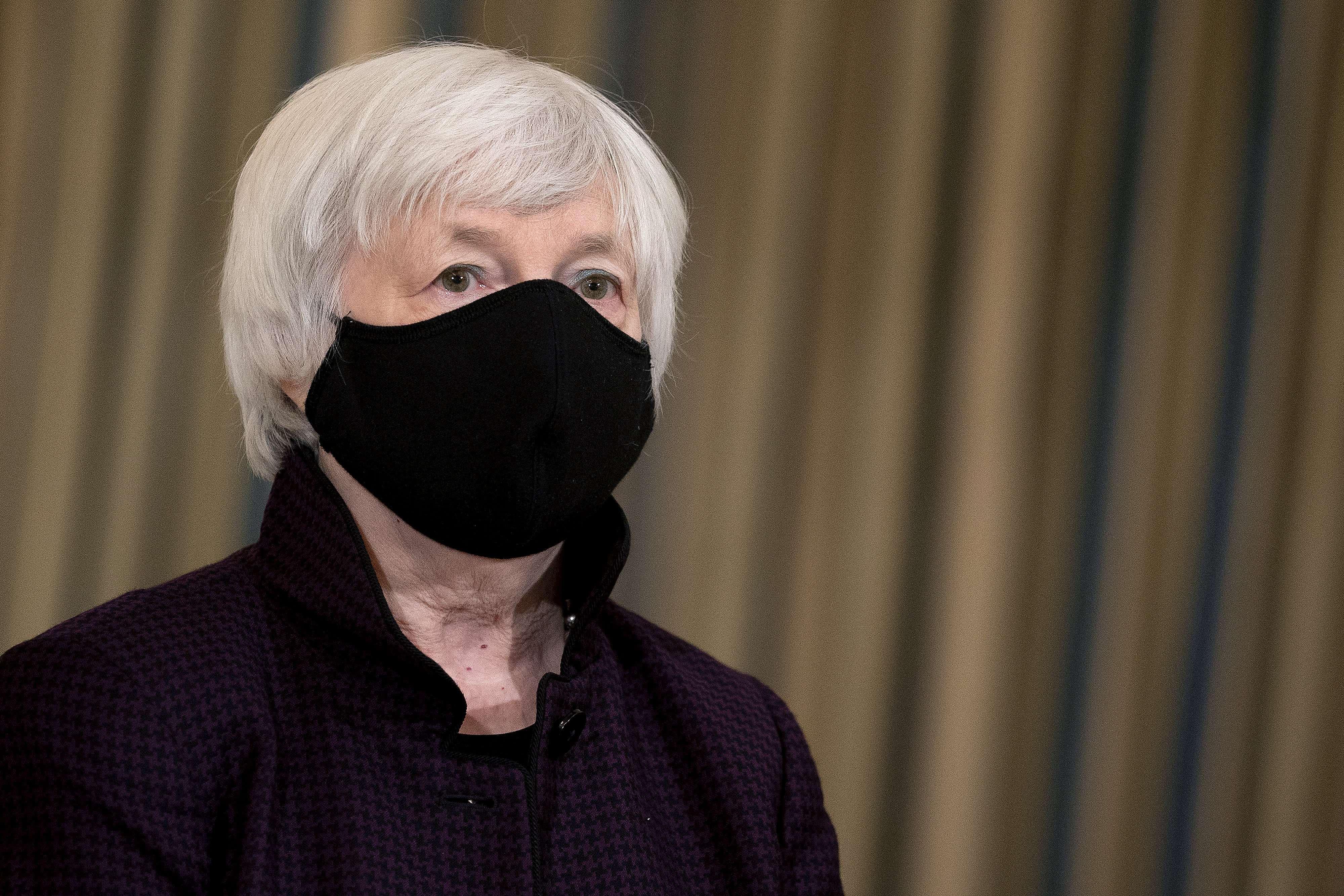
Treasury Secretary Janet Yellen listens to President Joe Biden as he delivers remarks on the national economy and the need for his administration’s proposed $1.9 trillion coronavirus relief legislation in the State Dining Room at the White House on February 05, 2021 in Washington, DC.
Stefani Reynolds | Getty Images
Following four years of a decidedly protectionist agenda, Treasury Secretary Janet Yellen is here to tell you that things are about to change in a major way.
The Cabinet official most in charge of President Joe Biden‘s economic agenda set forth a bold set of principles Monday that differ from the previous administration’s priorities by about as much as one could imagine.
Gone is former President Donald Trump‘s saber-rattling against China. In its place is a policy that “will be competitive where it should be, collaborative where it can be” but only “adversarial where it must be.”
Where Trump and his Treasury leader, Steven Mnuchin, used their pulpit not only to pick fights with traditional adversaries like China but also traditional allies such as Germany, Yellen countered with “America first must never mean America alone.”
And while the past administration paid generally little heed to issues like diversity and climate change, Yellen said both are at the center of not only the U.S. social agenda but also its economic one.
Drawing a line between the past and present, Yellen asserted, in a speech to the Chicago Council on Global Affairs, that “the most important difference today is a fundamental recognition that our policies at home and abroad must be designed to be inclusive, tackle inequality, and respect our environment.”
Global speech for a global audience
The searing rhetoric, though, was no ordinary policy speech.
Instead, it serves essentially as a curtain-raiser for this week’s World Bank/International Monetary Fund spring meeting.
The message: that globalization, and the U.S.’s perceived role as the center of the mission, is back in vogue.
“Over the last four years, we have seen firsthand what happens when America steps back from the global stage,” Yellen said. “America first must never mean America alone. For in today’s world, no country alone can suitably provide a strong and sustainable economy for its people.”
Those weren’t the only tough words Yellen had for the prior administration.
Without naming Trump, she criticized the slow response to the Covid-19 pandemic, saying the White House “failed to engage early to address the crisis beyond our borders,” which Yellen said made the economic aspect even worse. She stressed the importance of not just stopping the virus at home, but also in other nations.
However, before the pandemic arrived, the economy had been doing well under the protectionist Trump, who often used the term “globalists” disparagingly against some of his own administration officials.
Unemployment was at a 50-year low, inflation was in check, and the administration, despite its repeated alienation of allies around the world, managed to negotiate a new trade agreement with Canada and Mexico and redraw arrangements elsewhere.
Leading economic officials including Federal Reserve Chairman Jerome Powell have lamented that the wealth gap had been closing meaningfully prior to the pandemic and now has widened again, largely the result of economic restrictions put in place to combat the virus.
Despite criticism from the political left on his handling of global trade and the widespread tariffs put in place, Biden has indicated little change in that approach. The bulk of Trump’s tariffs have been left in place.
Further, the Trump years featured consistently above-trend economic gains not to mention a strong stock market.
For Yellen, though, the message was about more than numbers.
‘More inclusive global economy’
She talked about the importance of getting displaced women back in the workforce, and emphasized the important of providing aid to minorities who also have been hit disproportionately hard during the pandemic. Climate change, she said, is “the biggest long-term threat the world faces.”
Overall, she said the administration’s aim is “to fight poverty and promote a more inclusive global economy that aligns with our values.”
From a headline perspective, the two big proposals were getting G-20 nations to agree on a minimum global corporate tax and another aim, announced last week, to approve $650 billion in special drawing rights that will provide U.S. dollars to IMF members.
Both moves might have a distinctly global focus that the Trump administration mostly eschewed, other than an effort to bring home profits that were stashed overseas.
Despite likely criticism that the Biden administration’s international focus could threaten the U.S. at home, the Yellen speech sends a clear message that the days of America first are over for now.
“While we embraced trade as an engine for growth, we neglected those who did not benefit. And in the most recent period, when we might have adopted policies at home to face these issues and joined with our allies to address issues abroad, we isolated ourselves and retreated from the international order that we created,” Yellen said.
“We can do better,” she added, regarding inequality. “We must do better.”




